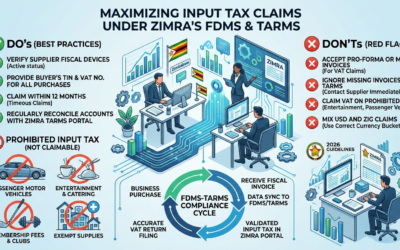All audits are stressful, but of all audits, Zimbabwe Revenue Authority (ZIMRA) audits are the worst. ZIMRA officers are the most scary enforcers businesses hate. The moment they do client visits, businesses are gripped with fear. But, we are here assuring to businesses, ZIMRA offers are the most understanding enforcers. this articles will assist the business community on how to navigate through ZIMRA Audits with easy.
Handling ZIMRA audit effectively requires careful preparation, cooperation, and understanding of tax compliance processes. Below is a structured guide to navigate a ZIMRA audit:
1. Pre-Audit Preparation
Organize your records:
- Maintain organized records for at least 6 years, including:
- Tax returns (income tax, VAT, PAYE)
- Financial statements and ledgers
- Invoices, receipts, and bank statements
- Payroll records and import/export documentation (if applicable).
- Use accounting software (e.g., Pastel, QuickBooks) for accuracy and ease of access.
Conduct Internal Reviews:
- Perform regular internal audits to identify discrepancies or unpaid taxes.
- Reconcile accounts (e.g., VAT input/output tax) and rectify errors proactively.
Consult Professionals:
- Engage a tax advisor or lawyer with ZIMRA expertise to review compliance and represent you if needed.
- As lucent we are ready to do your tax healthy checks every year
2. Responding to the Audit Notice
- Review the Notice:
- Confirm the audit scope (tax types, periods under review) and deadlines.
- Note the auditor’s contact details and required documents.
- Notify Stakeholders:
- Inform your finance team, management, and external advisors.
- Assign a primary contact to manage ZIMRA communication.
3. During the Audit
- Cooperate Transparently:
- Provide requested documents promptly.
- Avoid sharing unnecessary information; stick to the scope.
- Escort auditors during physical inspections (e.g., warehouse visits).
- Clarify Disputes Professionally:
- Seek detailed explanations for any disagreements.
- Respond with supporting evidence (e.g., invoices, legal interpretations).
- Document all interactions with auditors.
4. Post-Audit Actions
- Review the Final Assessment:
- Check for accuracy in additional tax assessments, penalties, or interest.
- Negotiate payment plans if liabilities are valid.
- Implement Recommendations:
- Address compliance gaps (e.g., improved record-keeping, staff training).
- Update accounting systems and internal controls.
5. Proactive Compliance Measures
- Stay Updated:
- Monitor changes in tax laws via ZIMRA updates or professional advisories.
- Train Staff:
- Educate finance teams on ZIMRA requirements and compliance best practices.
- Leverage Technology:
- Use automated systems for tax calculations, filings, and record retention.
Voluntary Disclosures:
- Disclose errors proactively to reduce penalties (e.g., under ZIMRA’s Voluntary Disclosure Program).
Key Considerations
- Penalties: Late payments, under-declarations, or fraud may attract fines (up to 100% of tax owed) and interest.
Objections/Appeals:
- File objections within 30 days of assessment .
- Escalate unresolved disputes to the Fiscal Appeal Court if necessary.
- Communication: Maintain professional dialogue with ZIMRA to resolve issues efficiently.
By following these steps, you can minimize audit risks, demonstrate compliance, and foster a cooperative relationship with ZIMRA. Always prioritize accuracy, transparency, and proactive tax management.



